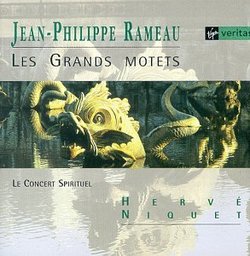| All Artists: Jean-Philippe Rameau, Hervé Niquet, Veronique Gens, Jean-Paul Fouchécourt, Le Concert Spirituel, Isabelle Desrochers, Peter Harvey, Marcos Loureiro de Sa, Stephan Imbodem, Herve Lamy Title: Rameau - Les Grands Motets / Gens · Desrochers · Fouchécourt · Lamy · Harvey · Loureiro de Sa · Imbodem · Le Concert Spirituel · Niquet Members Wishing: 0 Total Copies: 0 Label: EMI Import Release Date: 4/6/1999 Album Type: Import Genre: Classical Styles: Opera & Classical Vocal, Historical Periods, Baroque (c.1600-1750) Number of Discs: 1 SwapaCD Credits: 1 UPC: 724356152625 |
Search - Jean-Philippe Rameau, Hervé Niquet, Veronique Gens :: Rameau - Les Grands Motets / Gens · Desrochers · Fouchécourt · Lamy · Harvey · Loureiro de Sa · Imbodem · Le Concert Spirituel · Niquet
CD Details |
CD ReviewsA French Baroque gem dancetraveller | New York | 02/08/2000 (5 out of 5 stars) "Herve Niquet's conscientious conducting and a cast that's a veritable who's who of French baroque vocal work make this rerelease of a 1993 French recording well worth a listen. Rameau was unquestionably a musical genius, and so it's a bit upsetting that only four of the many sacred works he must have written during his life have survived to this day; three of them are on this recording. Because of the chronological organization of the three motets, one can truly hear the development of Rameau's artistry, technical sophistication and mastery of form. The last motet, In Convertendo, should convince anyone that the underappreciated Rameau deserves a place in the high throne of baroque music. Certainly the French believe so; his somewhat hunched marble form graces the entrance of the Paris Garnier.High praises must go to the crystalline playing of Le Concert Spirituel, whose sense of balance, baroque musical practice, and spiritual ardor are essentially perfect. The emsemble singing is splendid, tight and unified without being overly blended. And I can't help but be completely entralled by the ringing, angelic timbre of haute-contre Jean-Paul Fouchecourt, who gives the "aria" in "In Convertendo" the sort of incredibly passionate attack that makes one listen to every note as if it were a vindication of the power, and struggle, of the human spirit. A similar sense of struggle and pleading comes across in "Converte," in the same motet, in which a pensive bass solo is interrupted several bars later by an utterly cheerful Rameauian violin riff that musically paints the next line of the text from psalm 125: "We sigh after thee as the lands of the south sigh after the overflowing waters that feed them." In what you could call musical transubstantiation, we actually hear the waters. Rameau had the enviable talent for combining his musical dexterity with a vivid, if somewhat literal, imagination, and so he brings a glowing, vibrant color to his sacred writing; fortunately for us, Niquet and his devoted cast of singers and instrumentalists have the same talent." Brilliant, outclasses Herreweghe's 1982 recording Leslie Richford | Selsingen, Lower Saxony | 01/26/2005 (5 out of 5 stars) "Jean-Philippe Rameau is remembered today mainly for his stage works ("Hippolyte et Aricie", "Platée", "Les Indes Galantes"), all written after he had spent many years working as an organist and keyboard player in relative obscurity. During this time he was employed by the Church, and the motets gathered on this recording bear testimony to his earlier work, being the three motets that have survived. (There is a fourth work, "Laboravi", which consists of only one verse and needs less than three minutes to perform; Niquet has chosen to leave it out of this performance.) They are wonderfully varied and make it very evident that lovers of baroque music ignore France and Rameau in particular at their peril. Here there is some delightful choral singing and absolutely heavenly instrumental parts, capped by some of the most attractive solo singing I have heard recently: I don't want to pick out any one of the soloists because they all deserve unmitigating praise. The 1993 Radio France recording is brilliant, capturing all the nuances of this complex music in a broad, transparent panorama that makes for exquisite listening pleasure.
I was able to compare Niquet's disc with the Harmonia Mundi recording of "In convertendo" and "Quam dilecta" made by Philippe Herreweghe and his Chapelle Royale in 1982 in a church in Ghent in Belgium. Herreweghe, too, had some wonderful soloists, but the recording is to my mind inferior to the Niquet because of the sound quality: the singers are much more distant and much less brilliantly captured on disc, also I felt that the English singer Stephen Varcoe (baritone) was not quite up to the standard on the Concert Spirituel recording. Herreweghe only recorded two of Rameau's "grand motets", but he added "Laboravi", so if you need to hear that you will have to buy both discs." |


 Track Listings (24) - Disc #1
Track Listings (24) - Disc #1